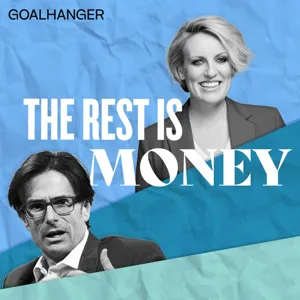Podcast Summary
Focusing on risk-adjusted returns instead of just maximizing returns: Post-2008 financial landscape led to growth of private credit, a middle ground between small businesses and large corporations, competing with large institutions for larger deals, understanding its nuances is crucial
While maximizing expected return is a common goal in finance, it's crucial to be cautious against this pursuit and instead focus on risk-adjusted returns. The financial landscape has seen significant shifts post-2008, leading to the rapid growth of private credit, a sector that falls outside of traditional banking regulations. Private credit, which has more than doubled in size over the past decade to $1.5 trillion, serves a middle ground between small businesses and large corporations. Companies like Melissa and Doug (toy manufacturer) and Big Ass Fans (maker of large industrial fans) are examples of this middle ground. As private credit continues to grow, it's increasingly competing with large financial institutions for larger business deals. It's essential to understand the nuances of private credit and its role in the financial ecosystem.
Private Credit and Private Equity: A Flexible Lending Relationship: Private credit, fueled by its relationship with private equity, offers businesses more flexible and personalized lending arrangements compared to traditional bank loans, enabling effective communication and negotiation in a collaborative environment.
The private credit market has grown significantly and now plays a crucial role in financing businesses, particularly those owned by private equity firms. This symbiotic relationship between private equity and private credit allows for more flexible and personalized lending arrangements compared to traditional bank loans. With a smaller pool of lenders and more direct relationships, private credit offers borrowers the ability to communicate and negotiate more effectively, creating a more collaborative environment. However, it's important to note that the counterparty in these transactions is often private equity, which can lead to a more complex dynamic where both parties have some leverage in the relationship. Overall, the private credit market's growth and its relationship with private equity have created a more flexible and personalized lending landscape for businesses facing financial challenges.
Private credit vs public debt: Different purposes and challenges: Private credit offers flexibility to borrowers, but lacks transparency, while public debt markets have more transparency but offer less flexibility. During low-interest-rate era, public debt markets had more leverage, but concerns about private credit transparency and potential risks are growing.
Private credit and public debt markets serve different purposes and come with distinct advantages and challenges. In private credit, lenders often prefer to give borrowers more time and flexibility to turn around their business, but the lack of transparency and the dispersed nature of public markets make this more difficult. Additionally, during the low-interest-rate era, borrowers in public debt markets had more leverage, allowing them to negotiate generous contract terms that limited lender recourse. However, as private credit has grown, concerns about its transparency and potential interlinkages have increased, leading some to worry about potential risks in this sector. Overall, understanding the nuances of these markets and the implications of their growth is crucial for investors and market participants.
Private credit market during a financial crisis: The private credit market, involving loans to private companies, raises concerns due to its dispersed nature, lack of transparency, and untested status during a financial crisis. While investors are sophisticated, potential consequences might be less severe compared to the 2008 crisis, as private credit funds are less leveraged.
The private credit market, which involves loans to private companies, raises concerns due to its dispersed nature, lack of transparency, and untested status during a major financial crisis. While the end investors, such as pension funds and sovereign wealth funds, are supposed to be sophisticated and have good risk management, the potential consequences might be less severe compared to the 2008 financial crisis where banks held the bag. Private credit funds are less leveraged than banks, with $1 turned into $2 or $3, as opposed to banks being leveraged 1 to 10 or 11 times. The fear lies in the uncertainty of how this sector will fare during a recession or financial issue, as it has not been tested on a large scale yet.
Shift of leverage from banks to companies in private credit: Untested private credit market could pose risks for investors, particularly with rising interest rates and potential financial strain on highly leveraged companies.
While the shift of leverage from banks to companies in private credit may dispersed risk, the untested nature of this market and the potential impact of rising interest rates on highly leveraged companies could pose significant risks. The investors holding the bags at the end of the day are likely to be big institutional investors or wealth managers, but if borrowing costs increase, companies could face financial strain as their revenues decline while their interest costs rise. This uncertainty makes the private credit market a cause for hesitation.
Economics Job Market Rumors Forum Exposes User IP Addresses: The Economics Job Market Rumors Forum, a platform for anonymous discussions, has been found to have poor IP address protection, potentially revealing users' identities and causing unease among academics.
The Economics Job Market Rumors Forum, an anonymous message board for economists, has been exposed for poor IP address protection, leading to potential identification of users. This revelation has caused a stir in academia, particularly in economics, as the forum has been a platform for controversial and unfiltered discussions. The lack of anonymity and the subsequent exposure have resulted in fear and concern among users. A recent paper and presentation have highlighted the vulnerability of the forum, revealing IP addresses of users and causing a wave of reactions. The findings have led to a heightened sense of unease, with some users expressing more about their colleagues from certain institutions than vice versa. The incident serves as a reminder of the importance of online security and the potential consequences of anonymous discussions.





